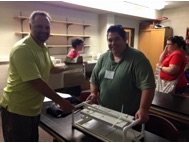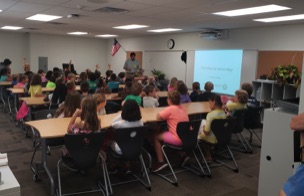Outreach



Collaborating teachers (leftmost pane, from left to right: Marty Buehler, Hastings School district, MI; me; Tory Wenger, Bloomingdale School District, MI) pitching the lesson plan and distributing the kits to local high school teachers at the KBS K-12 Summer Institute, August 2016.
*** Additional kits are availible, and I am very interested in connecting with teachers in Indiana that are interested in trying out our lesson plan in their classroom. If you are a teacher and are looking for a hands-on research experience for your students, please contact me! ***
Another resource we developed was a “Data Nugget" based upon field reciprocal transplant experiments, as well as freezing tolerance data from a broad sample of populations. Data Nuggets are exercises based on real datasets that provide students with the ability to answer questions and gain quantitative skills.
— I have also participated in the Planting Science program since 2013, where I serve as a scientist mentor for middle and high school teachers and students conducting in class research projects.

In addition to conducting our own research, we are actively involved in outreach activities aimed to improve scientific literacy, provide experiential learning opportunities for students, and promote careers in science.
— In October of 2019, Chris and Josh visted Klondike Elementary School to give a presentation and show-and-tell on plant ecology and adaptation to groups of 3rd graders (about 150 in total). The kids had a blast and we did too. The highlight of the show and tell was a flowering Stapelia spp. whose flowers are fly pollinated carrion mimics. We also set up an experiment on the influence of nutrient addition on plant growth using Arabidopsis thaliana and the kids described below. The students are caring for the plants and collecting the data - we are looking forward to seeing how it turns out. Thanks to Rebecca Thompson and the other 3rd grade teachers at Klondike for collaborating with us.
— As part of our prior NSF grant (DEB-1556262) we collaborated with MSU's W. K. Kellogg Biological Station K-12 partnership and two area high school teachers to develop two publically available educational resources based on our work on the genetic basis of adaptation and freezing tolerance.
One resource is a lesson plan for a hands-on project on freezing tolerance, supporting Next Generation Science Standards (NGSS; National Research Council) to promote inquiry based learning in classrooms. The lesson plan touches on several NGSS themes: evolution by natural selection, geographic spread of populations due to climate change, and adaptation. The lesson plan involved a modified freezing tolerance assay that could be carried out in any classroom with access to a standard refrigerator/freezer. Students are provided with seeds of the model plant Arabidopsis thaliana from near the northern and southern edge of the native range, and can experimentally address questions about adaptation to different climatic regimes. Along with the lesson plan, we distributed complete kits (including a rack, lights, timer, soil, containers, and seeds) to eight Michigan high school teachers at the KBS K-12 Summer Institute.
